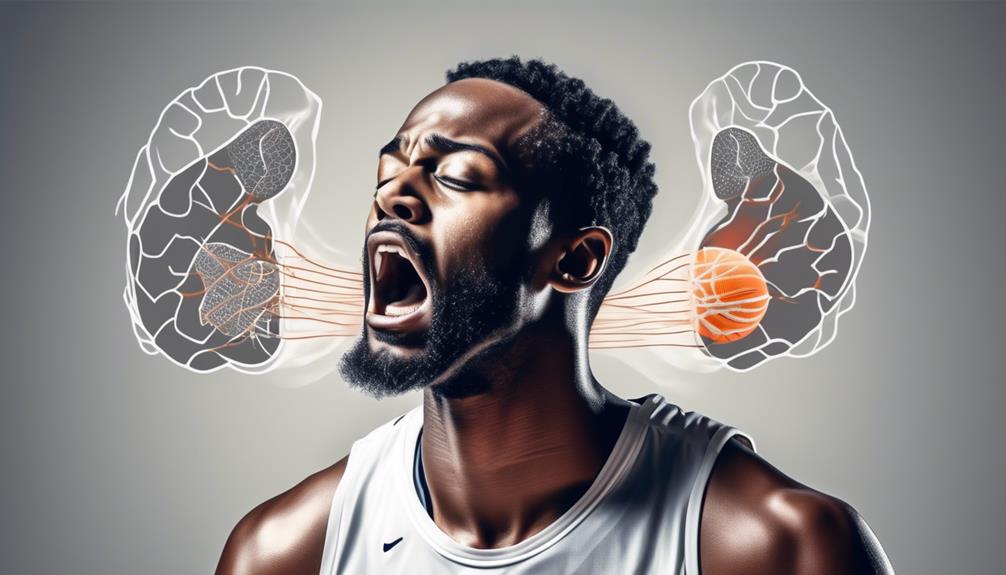Exploring Basketball's Influence on Human Body Physiology
As you lace up your basketball shoes and step onto the court, you may not realize the profound impact this sport has on your body beyond the physical exertion.
Basketball is not just a game; it serves as a fascinating platform to explore the intricate ways in which the human body responds and adapts to the demands of the sport.
From cardiovascular adaptations to neurological enhancements, the influence of basketball on human body physiology is a multifaceted and compelling subject.
Understanding these effects can provide valuable insights into optimizing performance, preventing injuries, and enhancing overall health.
Cardiovascular Adaptations
When playing basketball regularly, your cardiovascular system adapts to the demands of the sport by increasing heart rate and improving circulation efficiency. This leads to significant improvements in heart health and overall performance.
The continuous running, jumping, and quick direction changes during a basketball game require your heart to pump more blood to deliver oxygen and nutrients to working muscles. This constant demand for oxygen delivery and energy production leads to enhanced cardiovascular function. As a result, your heart becomes more efficient at pumping blood, which lowers your resting heart rate and increases your cardiac output. These adaptations not only improve your cardiovascular health but also enhance your overall athletic performance on the basketball court.
The increased efficiency in oxygen delivery also allows your muscles to work harder and for longer durations. With better circulation, your body can more effectively remove waste products such as carbon dioxide and lactic acid, which are byproducts of energy production. This efficient removal of waste products helps delay the onset of muscle fatigue, allowing you to sustain high-intensity efforts throughout the game.
Additionally, the improved oxygen delivery enhances your endurance, enabling you to recover more quickly between sprints and intense plays.
Muscular Endurance and Strength
Improving muscular endurance and strength through basketball involves targeted strength training exercises and consistent practice to build and tone muscles essential for the demands of the game. Endurance training and hypertrophy are key components in developing the muscular capacity necessary for basketball.
Here are four essential elements to consider:
- Muscle Fatigue: Basketball places significant demands on your muscles, leading to fatigue during intense games or practices. Understanding how to manage and mitigate muscle fatigue is crucial for maintaining performance and preventing injury.
- Recovery: Proper recovery is vital for muscular endurance and strength. Adequate rest, nutrition, and recovery techniques are essential for allowing muscles to repair and grow stronger after strenuous workouts and games.
- Endurance Training: Endurance training is essential to build the stamina required for the continuous physical demands of basketball. It involves activities that improve cardiovascular health and enhance the endurance capacity of muscles.
- Hypertrophy: Engaging in targeted strength training exercises promotes muscle hypertrophy, leading to increased muscle mass and strength. This is crucial for generating power and explosiveness on the court.
Incorporating these elements into your basketball training regimen can significantly enhance your muscular endurance and strength, ultimately improving your overall performance on the court.
Bone Density and Health
To maintain healthy bones and prevent injuries, prioritize activities that promote bone density and strength, such as weight-bearing exercises and proper nutrition.
Basketball, with its dynamic movements and jumps, can have a significant impact on bone remodeling. The constant stress placed on your bones during basketball games and practices stimulates the bone-forming cells, leading to increased bone density and strength over time.
Regular participation in basketball can also influence osteoporosis prevention. Osteoporosis is a condition characterized by low bone density, which makes bones fragile and susceptible to fractures. By engaging in weight-bearing activities like basketball, you're helping to maintain and improve your bone density, reducing the risk of developing osteoporosis later in life.
In addition to the physical demands of basketball, proper nutrition plays a crucial role in bone health. Consuming a balanced diet rich in calcium, vitamin D, and other essential nutrients provides the building blocks necessary for bone formation and maintenance. It's important to include dairy products, leafy greens, fortified cereals, and other calcium-rich foods in your diet to support your bone health.
Flexibility and Range of Motion
Regular participation in basketball helps improve your flexibility and range of motion due to the dynamic movements and diverse muscle engagement involved in the sport. This has several significant benefits for your overall physical health and athletic performance:
- Injury Prevention and Joint Stability: The flexibility gained from basketball helps to prevent injuries by allowing your joints to move through their full range of motion without strain. Additionally, the engagement of stabilizing muscles during dynamic movements contributes to better joint stability, reducing the risk of sprains and strains.
- Performance Enhancement and Agility Training: Improved flexibility and range of motion directly translate to enhanced athletic performance, particularly in terms of agility and quickness on the basketball court. The ability to move freely and swiftly, pivot, change direction, and react responsively is crucial for success in basketball, and these skills are honed through the sport's demands on flexibility.
- Muscle Coordination and Balance: Basketball requires a high level of coordination and balance, both of which are closely tied to flexibility and range of motion. The varied movements and positions in basketball help to develop these aspects, leading to better overall physical control and stability.
- Long-Term Health and Functionality: Flexibility and range of motion are essential for maintaining physical functionality as you age. Engaging in basketball can help you preserve these qualities, leading to a higher quality of life and reducing the risk of mobility-related issues in later years.
Metabolic Rate and Energy Expenditure

Basketball's influence on your body's flexibility and range of motion also extends to your metabolic rate and energy expenditure during physical activity. Engaging in basketball increases your metabolic rate, leading to improved weight management through the burning of calories. The high-intensity nature of basketball prompts your body to regulate hormones such as adrenaline and cortisol, which play a crucial role in energy expenditure and weight control.
As you play basketball, your body becomes more efficient at utilizing energy, thereby enhancing exercise efficiency. The dynamic movements involved in basketball, such as running, jumping, and quick changes in direction, require your body to adapt and optimize performance. This results in an increased calorie expenditure, contributing to weight management and overall physical fitness. Additionally, the continuous and varied movements in basketball help in performance optimization, as they challenge your body to adapt and become more proficient in energy expenditure.
The combination of hormonal regulation, exercise efficiency, and performance optimization during basketball significantly impacts your metabolic rate and energy expenditure. This not only contributes to weight management but also enhances your overall physical well-being. Therefore, by engaging in basketball, you're actively influencing your body's metabolic processes to achieve improved energy expenditure and performance optimization.
Neurological Enhancements
Engaging in basketball can enhance your neurological functions, improving cognitive abilities and coordination. It's not just about shooting hoops; it's about the impact on your brain. Here's how basketball can boost your neurological health:
- Enhanced Focus: Basketball requires quick decision-making, spatial awareness, and the ability to anticipate movements. These skills can help sharpen your focus, making it easier to concentrate on tasks both on and off the court.
- Improved Coordination: Dribbling, passing, and shooting all require precise hand-eye coordination. Over time, these movements can strengthen the neural connections between your brain and muscles, leading to improved coordination and dexterity.
- Increased Brain Plasticity: The fast-paced nature of basketball challenges your brain to adapt and learn new strategies. This can promote neuroplasticity, the brain's ability to reorganize itself by forming new neural connections. As a result, you may find it easier to pick up new skills and adapt to changes in your environment.
- Stress Reduction: Playing basketball can act as a stress reliever, stimulating the release of endorphins and reducing cortisol levels. This can have a positive impact on your neurological health, helping to alleviate symptoms of anxiety and depression.
Respiratory Function and Efficiency

Improving respiratory function and efficiency, basketball involves dynamic movements that challenge your lungs and cardiovascular system, leading to physiological adaptations. The sport demands rapid changes in movement, from sprinting and jumping to sudden stops and changes in direction. This requires your body to efficiently utilize oxygen and deliver it to the working muscles, enhancing oxygen consumption and overall performance.
As you engage in basketball, your respiratory muscles, including the diaphragm and intercostal muscles, are constantly at work to support breathing during intense physical activity. Over time, this leads to improved endurance of the respiratory muscles, allowing you to sustain prolonged periods of play without experiencing undue fatigue.
The high-intensity nature of basketball also contributes to increased lung capacity. The deep breathing patterns required during the game help to expand lung volume, enhancing the efficiency of oxygen exchange within the lungs. This not only supports your performance on the court but also has broader implications for overall respiratory health.
In essence, basketball challenges and strengthens your respiratory system, leading to enhanced oxygen consumption, improved performance, and increased endurance of the respiratory muscles. These physiological adaptations are crucial for meeting the demands of the sport and can have positive effects on your respiratory function beyond the basketball court.
Psychological Benefits
Discover how basketball can boost your mental well-being, enhancing your overall quality of life and performance both on and off the court. Engaging in this sport offers several psychological benefits that can positively impact your daily life. Here are four key ways basketball can enhance your mental health:
- Mental Toughness and Confidence Boost: Playing basketball requires resilience, perseverance, and the ability to handle pressure. These qualities translate into everyday life, helping you develop mental toughness and a confident mindset to tackle challenges and pursue your goals with determination.
- Stress Relief and Anxiety Reduction: The fast-paced nature of basketball, coupled with the physical activity it involves, serves as an excellent outlet for stress relief. The endorphins released during exercise can alleviate anxiety and promote a sense of well-being, leaving you feeling more relaxed and focused.
- Enhanced Mood and Emotional Well-being: The dynamic and interactive nature of basketball fosters camaraderie, teamwork, and social connection, which are essential for emotional health. The sense of belonging to a team and the enjoyment of the game can uplift your mood and contribute to overall emotional well-being.
- Improved Cognitive Function and Mental Agility: Basketball requires quick thinking, strategic planning, and split-second decision-making. Engaging in the sport regularly can sharpen your cognitive abilities, enhance mental agility, and improve overall brain function, leading to better performance in various aspects of your life.
Incorporating basketball into your routine can have profound effects on your psychological well-being, providing a holistic approach to maintaining a healthy and balanced lifestyle.
Frequently Asked Questions
Can Playing Basketball Help Improve Cognitive Function and Mental Agility?
Playing basketball can improve cognitive function and mental agility. It enhances decision making, reaction time, attentional control, and cognitive enhancement. The fast-paced nature of the game challenges your brain, leading to improved cognitive abilities.
Are There Specific Nutritional Recommendations for Basketball Players to Support Their Physiological Adaptations?
To support physiological adaptations, basketball players benefit from specific nutritional strategies and recovery methods. These aid in performance optimization and injury prevention. Proper hydration, balanced macronutrients, and timing of meals are crucial for maximizing potential.
How Does Playing Basketball Impact the Body's Immune System and Overall Health?
Playing basketball can enhance your immune response due to increased exercise intensity. Implementing proper recovery strategies, such as adequate rest and nutrition, can help maintain overall health and support immune function.
What Are the Potential Long-Term Effects of Playing Basketball on Joint Health and Injury Prevention?
You can improve joint stability and prevent injuries by playing basketball. The sport builds muscle strength, enhances cognitive function, and promotes mental agility. Nutritional support, immune response, and hormonal balance also contribute to injury prevention.
Are There Any Potential Negative Physiological Effects of Playing Basketball, Such as Overuse Injuries or Hormonal Imbalances?
Playing basketball can lead to overuse injuries due to repetitive movements and strain on joints. Additionally, intense training may cause hormonal imbalances. It's important to manage these risks through proper conditioning and rest.
Conclusion
Overall, playing basketball can have a significant impact on your body's physiology. From improving cardiovascular health and muscular strength to increasing bone density and flexibility, the sport offers a wide range of physical benefits.
Additionally, basketball can enhance neurological function, respiratory efficiency, and even provide psychological benefits.
So, next time you hit the court, remember that you're not just playing a game – you're also improving your overall physical health.
Keep shooting those hoops!
